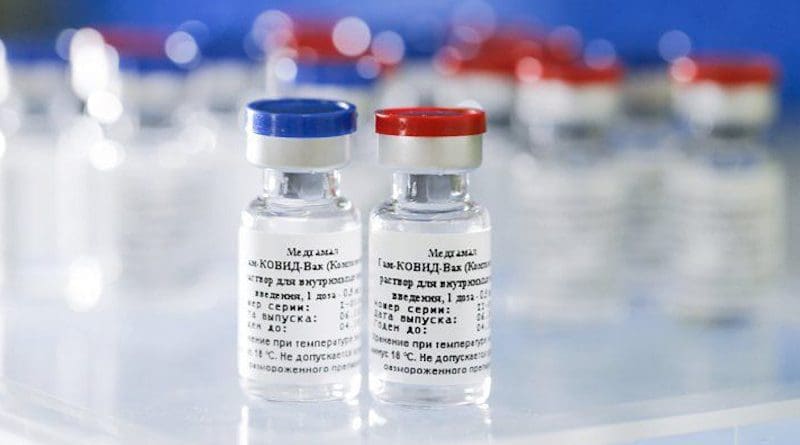Putin’s Logic: Russians Can Wait, Let’s Give Our Vaccines To Others – OpEd
When two people are having an argument, there’s always a third one who benefits from it. The argument between the European Commission (EC) and the pharmaceutical company AstraZeneca on the decreased supply of vaccines has revealed how complicated joint procurements can be, considering that many other countries want to acquire the vaccines and are willing to pay a higher price.
Now, the EC and its health commissioner have found themselves in an unenviable situation due to increased pressure from member states. There are evident downsides to Brussels’ renowned solidarity between member states, including the speed of decision-making. Solidarity also means that those countries who could financially afford more are restricted in their actions.1
This means that for individual countries the situation is far from being perfect – each country must sacrifice something in order for the European Union to stand by its values in these complicated times.
Unfortunately, some countries will be dissatisfied with this and some countries will try to take advantage of the situation.
Therefore, we must ask the question: how far is each country willing to go to achieve its ends?
People have always admired brave and selfless actions by someone who’s trying to save their friends, even more so when the helper sacrifices their own wellbeing.
But it’s important to understand whether there is any hidden agenda hiding behind these helpful acts. You can give water to someone who is thirsty simply because you feel sorry for them, but you can also do this to later demand something from them as gratitude. If a country has historically shown dishonesty in similar situations, people will view this country with suspicion even if its intentions are good.
We will not talk about the dishonesty of Putin’s Russia, as this is a well-known fact. The deeds of Putin’s Russia have persistently shown that the country cannot and should not be trusted.
So, this won’t be a story about a considerate neighbor who is helping someone simply because he has a good heart.
This story will be about vaccines. As I already mentioned, currently the EU is not demonstrating unity and trust. This has resulted in several member states becoming dissatisfied, which in turn has led to some of them being willing to sign any contract without regard for its future implications.
Czechia has asked Russia to provide its Sputnik-V vaccines, and according to unofficial information Czechia could receive these vaccines very soon.2 Czechia is not the first EU country to order the Russian-produced vaccine – Hungary is already vaccinating its people with Sputnik-V. In January, Hungary became the first EU nation to approve Sputnik-V and order two million doses that are to be delivered over the course of three months.3
We will use the case of Hungary to analyze Russia’s actions. And this time we will do so from the point of view of Russian citizens.
Russians are proudly chanting that their country was the first to develop a vaccine against Covid-19 and the first to begin production. Russia was also supposed to be the first country to begin vaccinating its people.
If we look at the information on the number of vaccinated people, we see that Brazil – which doesn’t produce its own vaccine – has used 8.1 million doses, compared to 3.9 million in Russia. If we compare Russia with a country that has also produced its own vaccine, the situation is even sadder. Putin’s Russia tries to present itself as a progressive and influential country just like the US and China. Yes, all three of these countries have developed their own vaccine against Covid-19, but the US has already used 70.45 million doses and China has used 40.52 million.4 But in Russia this number is strikingly low, while at the same time we see a lot of news articles stating that Russia will supply its vaccine to anyone willing to take it. As I already wrote, Hungary has received more than two million doses of the Russian vaccine – two million is also close to the number of people in Russia who have received Sputnik-V.
As shown in a report by the think tank Peterburgskaya Politika (Петербургская политика), when Russia began exporting its Sputnik-V vaccine abroad, Russians themselves could only get the vaccine in Moscow, as well as the distant and sparsely populated Sakhalin, Chukotka and the Nenets Autonomous Okrug.5
Does this mean that Russia decided that its own people can die, but that it will show solidarity and aid people from other countries?
What do Russians themselves think of this heroic sacrifice? Does Putin’s Russia consider foreign nationals more important than the Russian people?
I’m sorry, but I refuse to believe this is true. What are, then, Russia’s true intentions behind supplying its vaccine to other countries, while completely ignoring its own people? I have to agree with the now popular opinion that Russia is using its vaccine to increase its geopolitical influence at the expense of the Russian people – because they can wait.
3 https://www.delfi.lv/news/arzemes/covid-19-ungarija-sakusies-vakcinacija-ar-sputnik-v.d?id=52930805
4 https://ourworldindata.org/covid-vaccinations
5 https://www.lsm.lv/raksts/zinas/arzemes/krievija-piedava-sputnik-vakcinu-citiem-bet-pasiem-tas-

